Introduction
Each year thousands of people are exporting/importing exotic cars between various countries, I’ve always fancied owning a Honda Integra Type R (DC5) which were never sold natively in the UK but knew little about the process and costs involved. People do import them here to simply sell on with a little markup on top, but they demand a premium especially in recent years. Japan as an export location is a favourite for drivers in the UK as Japanese cars are right hand drive as they drive on the left hand side of the road.
Over the last couple of years I’ve been looking to buy a Golf GTI (MK5 or MK6) as an additional car and weekend fun. I wanted an unmodified car that had covered low miles, was in good cosmetic condition and had been serviced well. There are no shortage of Golf GTIs for sale in the UK but finding one that meets my criteria was difficult. Last year I paid top dollar for a MK5 (Photo below) and ended up returning it to the seller after discovering it had been remapped, there were signs of the engine having been modified and some other items had been bodged.
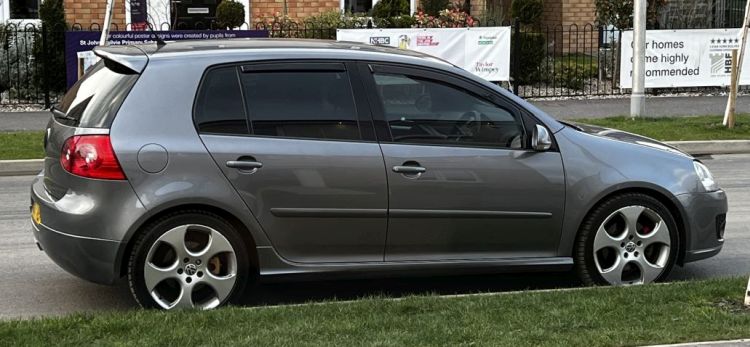
Importing a Golf GTI from Japan
I joined an enthusiasts group on Facebook to keep an eye out for the ideal Golf GTI coming up for sale when someone had mentioned to me that he’d imported two Golfs from Japan with absolutely no regrets – I started probing for more information and started my own research.
One thing I learned was that the the Golfs sold in Japan are manufactured in Germany just the same as the UK and European models, with some small changes that are required for the Japanese market – these changes are that the odometer and speedometer uses kilometers rather than miles as a measurement unit and that the radio frequency range is lower than ours. I know that the measurement units are easily changed on the MK6 Golf and also that the VW RCD330 (Genuine VW Radio with Apple CarPlay and Android Auto) is a direct fit to the MK6 Golf.
One big issue with the MK5 and the MK6 Golfs in the UK is that they rust really badly – I love VAG cars but I’m not convinced they are as superior as they once were. I learned that in many areas of Japan the roads are not salted and therefore the cars have less corrosion. When I started looking at the cars going through Japanese auctions I found a healthy stock of cars with no modifications, low miles and in excellent cosmetic condition. I started to learn more about the process and costs then decided this is how I’d purchase my next car.
The Process & Costs
While many elements of the process can be done solo, I opted to use an agent to support me with the process. There are various agents throughout the UK, Europe and Japan. I opted to use an agent in Japan who spoke perfect English and had a lot of experience servicing people in the UK. The agent I used charged 79,000 JPY (£490) and for this helped me find cars, translated auction sheets to English, provided guidance on what they sell for and what a realistic bid would look like and arranged inspections. When I won the car, the agent arranged the administration of other payments, shipping, transportation to the dock and they de-registered the car in Japan also. I don’t mind spending this money at all, it made the whole process very smooth for me.
When you find the car you like, you can opt to complete a history check (Similar to an HPI in the UK) that checks the ownership history, registration details, etc. You can also (and should) arrange a physical inspection of the car, this is where someone will go to the car at the auction house and provide you a summary of their findings. The inspection costs 3,000 JPY (£18.50) and is well worth it – I’ve listed below the output of the inspections that I had completed;
- Condition of bodywork compared to auction sheet
- Condition of alloy wheels and tyre health
- Condition of the interior
- Review of the cars service history if in the car
- Run the car and check it isn’t smoking or vibrating
- Confirm no warning lights show
- Confirmed no fluids leaking from the car
- Check condition of bushes and CV joint gaitor
- Checked level and condition of oil and coolant
- Check suspension dampening and condition
- Condition and operation of windows and mirrors
- Confirmed power steering works as expected
After this you should know if you’d like to place a bid on the car or not. If you would like to bid, the agent took a bid deposit of 60,000 JPY (£370) that would be refunded to me if unsuccessful or deducted from from the sale price of the car.
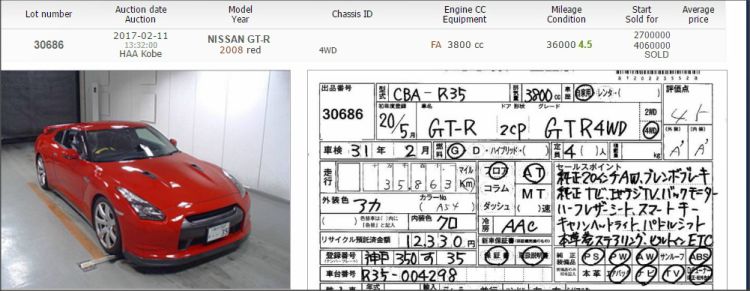
What happens when you win the car?
The agent handles the bidding process for you and will let you know overall if you’ve won the car, if you do win you’ll receive an invoice that covers various things such as;
- Sale price of the car
- Auction house fee
- Transportation to dock
- Export charge
- Freight and insurance charge – 240,000 JPY (£1,500)
- Agent fee 79,000 JPY (£490)
I paid this invoice by Bank Transfer – if it wasn’t clear already there is no option for finance when it comes to importing a car. Maybe a bank loan would work, I’m not sure. I can’t break down some of the items above as they were bundled together in the invoice I received.
When this is paid, the agent organized getting my car booked onto a ship. This is where I am in the process at time of writing (14th February 2023) my car should be leaving Japan on Friday this week and with me at the end of March!

What happens when it arrives in the UK?
You need to spend more money, here is what I’ll need to pay;
- Terminal Handling Fee – £100
- Customs Clearance – £75
- Duty – 10% of Winning Bid + Freight
- Tax – 20% of Duty, Winning Bid + Freight
As an example if the sale price of the car was £3,000 and freight was £1,000 that is a bill of £1,455 when it arrives in the UK.
My understanding is that it clears this process within a few hours and the car is ready to go. Unfortunately, as it isn’t a registered vehicle in the UK and is untaxed it can’t be driven on public roads so the next cost is transporting the car home. I’ve received prices of £250 to £300 to have the car collected from Newcastle and brought up to Glasgow.
When it comes home, I’ll need to get it MOT’d on the Vehicle Identification Number (VIN). I understand that you can drive the car to a local MOT testing station if the test is pre-booked so I’ll insure the car temporarily on the VIN and do this.
Assuming the car passes it’s MOT, I’ll send the certificate off with a DVLA registration form and tax and hopefully receive back the V5C a few weeks later which means I can apply some plates, insure and get it out a drive!
So what did I buy? Will I save money?!
The car I’ve bought is a 2010 Golf GTI in Candy White. The car is in great condition with full service history and no sign of rust or corrosion throughout and underneath. It has 24,500 miles on the clock and the following spec;
- 2.0 TSI Engine with 210 BHP
- DSG Gearbox with Flappy Paddles
- Bi-Xenon Cornering Headlights
- LED Rear Taillights
- Multi Function Steering Wheel
- Cruise Control
- Automatic Lights / Wipers
- Electric Heated and Folding Mirrors
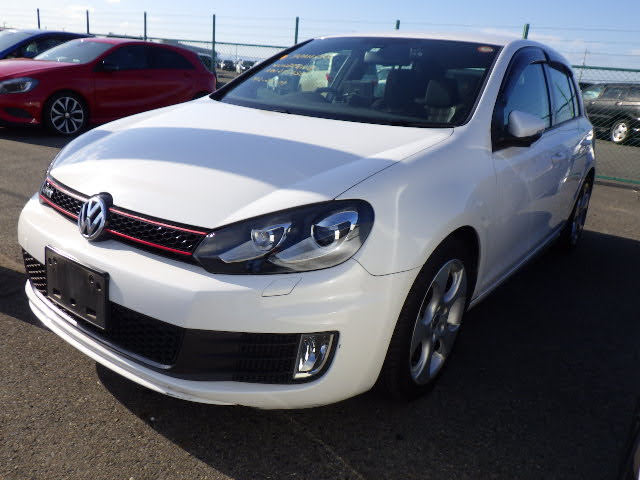
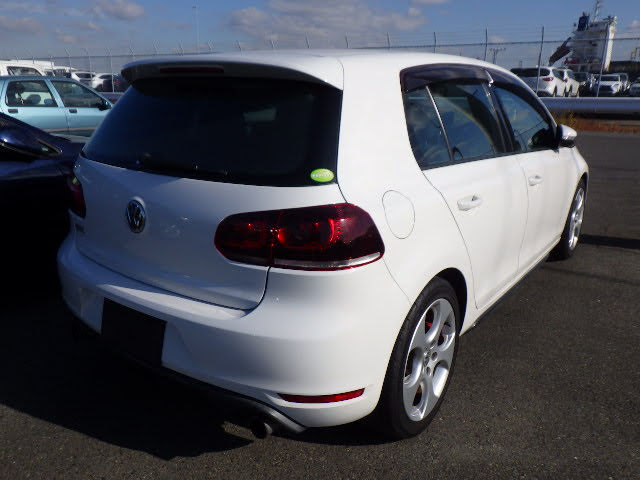
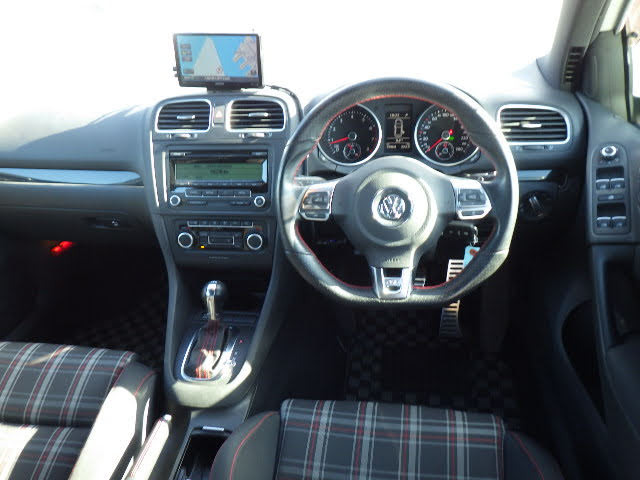
My rough calculations when I won the car gave me a total cost of somewhere between £7,500 to £8,000 for everything I’ve covered in this post. Though what I paid in JPY worked out less than my initial calculations – I anticipate the car costing less than £7,500.
What next?
I’m currently waiting for the car to arrive in the UK. I’ll post another update when it arrives and share my overall feeling about the whole experience and total cost. If you have any questions, please comment below or get in touch and I’ll address accordingly.
Update October 2023
My follow up post is available, click here to read on!
